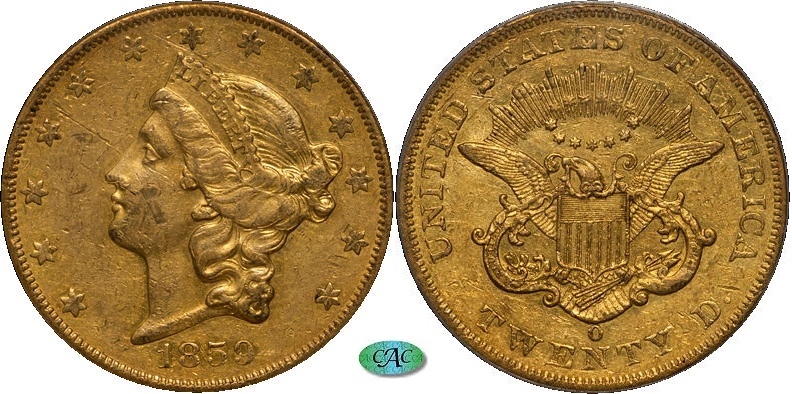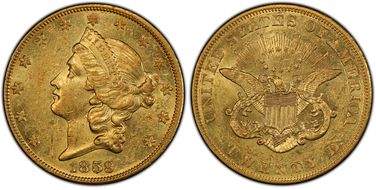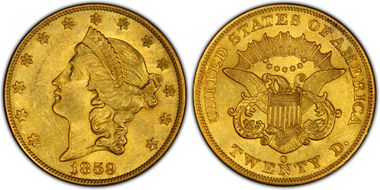1859-O $20 AU53 认证号08407515, PCGS号8927
拥有者评论
Winter V-1: Per Doug Winter, "I doubt if more than three or four have what could be termed as “positive” eye appeal. The typical 1859-O has been stripped and shows excessive abrasions. Pieces with original color and skin are rare, rare, rare!! It has been years since I’ve seen an 1859-O which I’ve liked. This coin? I LOVE it…Housed in an old green label holder and clearly undergraded by today’s standards; I think virtually anyone viewing this coin will call it a solid AU55." Hmm, 'nuff said! OGH. CAC.
专家评论
Doug Winter
The following information is from my eBook on Type One Liberty Head Double Eagles at http://doubleeaglebook.com/The 1859-O is the fourth-rarest Double Eagle from the New Orleans mint after the 1856-O, 1854-O and 1855-O. It is usually grouped with the 1860-O and they are similar in rarity but I have seen just a few more of the latter than the former.
STRIKE: This is a poorly-struck issue. Most 1859-O double eagles are flat on the curls around the face and below the ear. The hair at the top of the head shows around 50% of the definition while the bow is actually rather sharp. The obverse stars are typically weak with the first five showing less detail than the remaining eight. On the reverse, the wing tips and tail feathers are usually weak. Many 1859-O double eagles show slightly beveled edges with this more prominent on the obverse than on the reverse. A diagnostic hallmark seen on all genuine examples is a group of obverse clashmarks above and below the ear of Liberty and at the nape of the neck within the recesses of the lowest two curls. These are present even on lower grade coins.
SURFACES: Virtually all known examples show deep abrasions on the surfaces. These marks are compounded by the fact that the surfaces can be reflective, making these marks appear worse than they really are. Some have mint-made streaks in the planchet or copper spotting. I have seen many which are noticeably scratched as well.
LUSTER: The luster is prooflike with a slightly grainy texture. Most 1859-O double eagles are worn to the point that they have impaired (or virtually no) luster. On higher grade coins, the luster is impaired by heavy abrasions and/or repeated cleanings.
COLORATION: The natural coloration for this issue is a medium to deep yellow gold. This color is noticeably different than that seen on the New Orleans double eagles from the earlier part of the 1850’s which trend to be a deeper greenish-gold. Virtually all 1859-O double eagles have been cleaned or dipped at one time and I would bet that fewer than a dozen “original” pieces are currently known.
EYE APPEAL: The level of eye appeal for this date is well below average. The typical piece shows considerable wear, has been cleaned at least once, and has deep, detracting abrasions. An 1859-O which is CAC quality is worth a substantial premium over a typical example; certainly 20-30% and quite possibly more.
INTERESTING VARIETIES: All 1859-O double eagles have clashmarks on the obverse and a number have a star, from the reverse, clearly visible on the neck of Liberty.
Brian Kollar, a cataloger at Heritage, has discovered no less than three die varieties for this issue. It is not clear which is the rarest and none are dramatic.
PROOFS: No proofs were struck.
HOARDS: Two About Uncirculated examples were found on the S.S. Republic. A comparatively high grade 1859-O was found in a small cache of gold coins that was hidden on a Mississippi plantation. In the early to mid-1990’s, a small group of VF-EF pieces were found in Europe.
BUYING TIPS: Along with the 1855-O and 1860-O, this is one of the three most expensive coins most Type One double eagle collectors will purchase. I suggest you “overbuy” this issue and try and find the best 1859-O you realistically can afford. If it is a stretch, do what you need to make the deal happen. A nice 1859-O will make your Type One set better.
AUCTION RECORD: The current record for this date is $97,750 and this has been set twice. The first time was by Bowers and Merena 9/08: 845, graded AU58 by NGC. The second time was by Heritage 10/08: 3027, graded AU58 by PCGS. There are at least two private treaty sales in excess of $100,000.
FINEST KNOWN:
RARITY:
TOTAL KNOWN: 75-100
BY GRADE:
Very Fine: 28-38
Extremely Fine: 25-32
About Uncirculated: 20-28
Uncirculated: 2
POPULATION FIGURES: As of the beginning of 2015, PCGS had grade a single example in Uncirculated, an MS60. They have also recorded a total of 25 in various About Uncirculated grades. NGC has also graded a single example in Uncirculated, an MS61PL. They have also recorded 38 in various About Uncirculated grades including two from the S.S. Republic. The AU populations at both services are significantly inflated by resubmissions. CAC has not approved any Uncirculated examples.
PERFORMANCE SINCE 2002: In the current market, a choice Extremely Fine example of this date (equivalent to EF45) is worth in the area of $30,000-35,000. In 2002, the same coin would have been worth $12,500-17,500. In the current market, an above average quality About Uncirculated is worth $50,000-60,000+. In 2002, the same coin was worth $20,000-30,000 and would have been decidedly more appealing than today’s AU55.
COMMENTS: There are probably as many as 15 “no grade” 1859-O double eagles which are included in my total population estimate of 75-100 coins. This is a very scarce issue in all grades. It is seen most often in Very Fine to Extremely Fine, and it is rare in properly graded About Uncirculated. Most of the coins in this range are no better than AU50 to AU53 and a properly graded AU55 is very rare. Only two Uncirculated 1859-O double eagles are currently known and both are off the market in tightly-held collections.
David Akers (1975/88)
The 1859-O is one of the rarest regular issue Type I Double Eagles and I rank it as the fifth rarest of the 13 O-Mint issues behind only the 1856-O, 1854-O, 1860-O and 1855-O. It is definitely more rare than the lower mintage 1879-O, especially in high grade. I have seen only one uncirculated 1859-O and just a couple of AU's. The most likely grade one will encounter is VF and prooflike specimens are the norm. The 1859-O is sufficiently rare that it ranks in the top 10% of the entire series according to rarity based on both average grade and frequency of appearance.PCGS #
8927
设计师
James Barton Longacre
边缘
Reeded
直径
34.00 毫米
重量
33.40 克
铸币数量
9100
金属成分
90% Gold, 10% Copper
更高评级数量
15
评级较低的钱币数量
31
地区
The United States of America
价格指南
PCGS 数量报告
拍卖 - PCGS 评级的
拍卖 - NGC 评级的
稀有性和存量估计 了解更多
| 所有评级 | 95 |
| 60或以上 | 2 |
| 65或以上 | 0 |
| 所有评级 | R-8.0 |
| 60或以上 | R-9.9 |
| 65或以上 | R-10.1 |
| 所有评级 | 4 / 44 |
| 60或以上 | 4 / 44 TIE |
| 65或以上 | 1 / 44 |
| 所有评级 | 8 / 148 |
| 60或以上 | 4 / 148 TIE |
| 65或以上 | 1 / 148 |






















